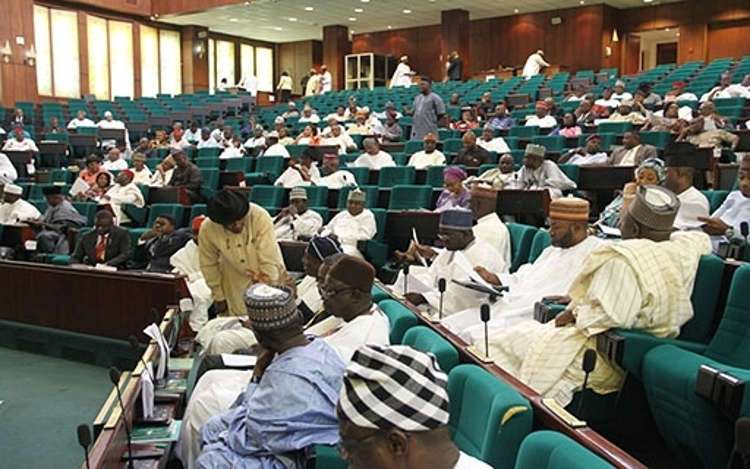The House of Representatives, Wednesday, resolved to set up an ad-hoc committee to investigate the recovered loot by the late Head of State, Gen. Sani Abacha, since 1998.
To this end, the ad-hoc committee is expected to dig out all recoveries made and mode of payments, how the money was disbursed and report back within the next six weeks.
This development was sequel to a motion under matters of public importance, entitled: ‘Urgent Need To Stop The Federal Government From Expending The Last Tranche Of The Abacha Loot Or Any Recovered Loot At All Without Parliamentary Approval’, promoted by Sunday Karimi, PDP, Kogi.
Recall that Eric Mayoraz, Swiss Ambassador to Nigeria, had during a round table on assets recovery organized by the Swiss Embassy in Abuja, noted that total sum of $722 million of Abacha’s family money hidden in Switzerland had been fully repatriated in 2005.
Mayoraz was quoted as saying that additional sum of $322 million, which was frozen by the Swiss Attorney-General, was repatriated in December, 2017.
The lawmakers noted that the move by President Buhari to share the recovered loot was in breach of section 12(1) of the 1999 constitution (as amended) which provides that the treaties and agreements reached by Federal Government must be ratified by the National Assembly.
While leading the debate, Karimi said, “Transparency International estimated that about $5billion public revenue was stashed abroad by the late Military Ruler, Gen. Sani Abacha, between 1993 and 1998 when he ruled the country.
“In 2014, Abacha family entered an agreement with the Federal Government, forfeiting several billions of dollars to the Federal Government, following a plea bargain to drop charges against the late Military Ruler’s son.
”The funds have been released to the federation in several tranches by Swistzerland government but without much disclosure to the public by government
“Recently, the Attorney General of the Federation signed an agreement on behalf of the government of the federation on the release of the last tranche of $322 million belonging to Nigeria.
“The Special Adviser to the President of the Federal Republic of Nigeria on Justice Reform, Juliet Ibekaku Nwagwu, was reported to have said that in line with Memorandum of Understanding signed by the Switzerland government and its Nigerian counterpart, the$322 million will be paid directly to the account of the poorest Nigerians without recourse to the National Assembly
“By virtue of section 12 (1) of the constitution of the federal Republic of Nigeria 1999 (as amended), no treaty between the Federal Government of Nigeria and any other country shall have the force of law except to the extent to which such treaty had been enacted by the National Assembly.
“Consequently, no agreement or MoU purportedly signed by the Federal Government with Switzerland government can have any force of law in Nigeria, except approved and enacted by this National Assembly.
“Cognizant that by virtual of section 80(1-3) and 81 of the Constitution of the Federal Republic of Nigeria (as amended) all revenue raised and received by the Federal Government shall be paid to the consolidated Revenue fund.
“Section 80(3) stipulated that no such monies raised shall be withdrawn from the consolidated Revenue fund unless the issue of such funds has been authorized by the National Assembly. As a result, no monies can be paid or expended without National Assembly approval
“If the money is shared as is being speculated, what was the modality used because we hear only 19 states are adjudged to be poor in Nigeria.
“They can’t spend Nigeria’s money and spend it the way they like and nobody is above the law, the money belongs to the country and must be distributed normally and Federal Government share should be used to complete the Ajaokuta Steel Complex.”
At this point, the presiding officer, Yakubu Dogara, threw the debate open to members to make their contributions.
In his contribution, Hassan Salem, stated, “How do we determine those earmarked to benefit or identification of poor families? I smell corruption in this whole exercise.”
Also contributing, Uzoma Nkem-Abonta, PDP, Abia, said, “We should also look at the economic multiplier effect, with all the intended reason to feed the poor although noble but let every member make bold to support this motion in protecting our laws.
“The constitution which is the grund norm says such payment should be made to Consolidated Revenue Fund, CRF, a departure from it will negate our laws.
“On the other hand, if we continue to feed the poor, will it continue? We should rather support wealth creation and support a sustainable method.”
Ossai Nicholas Ossai, PDP, Delta State, in his submission, supported the move but quickly pointed out that “section 12ss 2 looks into treaties and agreements that must be ratified by NASS.”
Chika Adamu, APC, Niger State, queried, “How are we going to share the money? For instance, if I recover my money, nobody has the right to tell me how to spend it.”
Nnenna Elendu-Ukeje PDP, Abia, said, “I support what Karimi said because to me, sharing the money does not make any economic sense as Switzerland does not have any right to tell us how to spend our recovered money.”
Abdulmunin Jibrin, APC Kano, however, raised an amendment to the motion that all the Abacha loots from 1998 should be investigated or “we won’t be doing our children any good because an account was not given of how the money recovered was disbursed.”
This development made the House to put Jibrin’s amendment to a voice vote which was unanimously carried.
The House, therefore, resolved to step down the prayers in Karimi’s motion, urging the House to direct the Presidency to pay the $322m recovered into the Consolidated Revenue Fund, CRF, pending the outcome of the adhoc committee investigative hearings.

